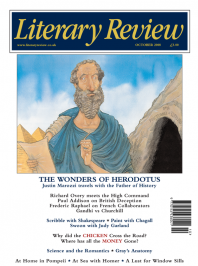Allan Massie
Walking with Ghosts
Pompeii: The Life of a Roman Town
By Mary Beard
Profile Books 360pp £25
As I write, the damage and death-toll of the latest earthquakes in China are being assessed, and the inhabitants of New Orleans are returning to the city from which they fled a few days ago, happy (one assumes) that Hurricane Gustav has been less destructive than was expected. ‘Events’, said Bismarck, ‘are stronger than the plans of men’, and even in our technologically advanced civilisation Nature frequently reminds us of her ability to provide terrifying and destructive events. The eruption of Mount Vesuvius in AD 79, which engulfed the towns of Pompeii and Herculaneum, was, in comparison with some of Nature’s other efforts, comparatively unremarkable.
If it is now remembered, when so many other natural accidents have been forgotten, it is first because of the eyewitness account ‘in a couple of letters written a quarter of a century after the event to the historian Tacitus by his friend Pliny who had been staying on the

Sign Up to our newsletter
Receive free articles, highlights from the archive, news, details of prizes, and much more.@Lit_Review
Follow Literary Review on Twitter
Twitter Feed
Under its longest-serving editor, Graydon Carter, Vanity Fair was that rare thing – a New York society magazine that published serious journalism.
@PeterPeteryork looks at what Carter got right.
Peter York - Deluxe Editions
Peter York: Deluxe Editions - When the Going Was Good: An Editor’s Adventures During the Last Golden Age of Magazines by Graydon Carter
literaryreview.co.uk
Henry James returned to America in 1904 with three objectives: to see his brother William, to deliver a series of lectures on Balzac, and to gather material for a pair of books about modern America.
Peter Rose follows James out west.
Peter Rose - The Restless Analyst
Peter Rose: The Restless Analyst - Henry James Comes Home: Rediscovering America in the Gilded Age by Peter Brooks...
literaryreview.co.uk
Vladimir Putin served his apprenticeship in the KGB toward the end of the Cold War, a period during which Western societies were infiltrated by so-called 'illegals'.
Piers Brendon examines how the culture of Soviet spycraft shaped his thinking.
Piers Brendon - Tinker, Tailor, Sleeper, Troll
Piers Brendon: Tinker, Tailor, Sleeper, Troll - The Illegals: Russia’s Most Audacious Spies and the Plot to Infiltrate the West by Shaun Walker
literaryreview.co.uk